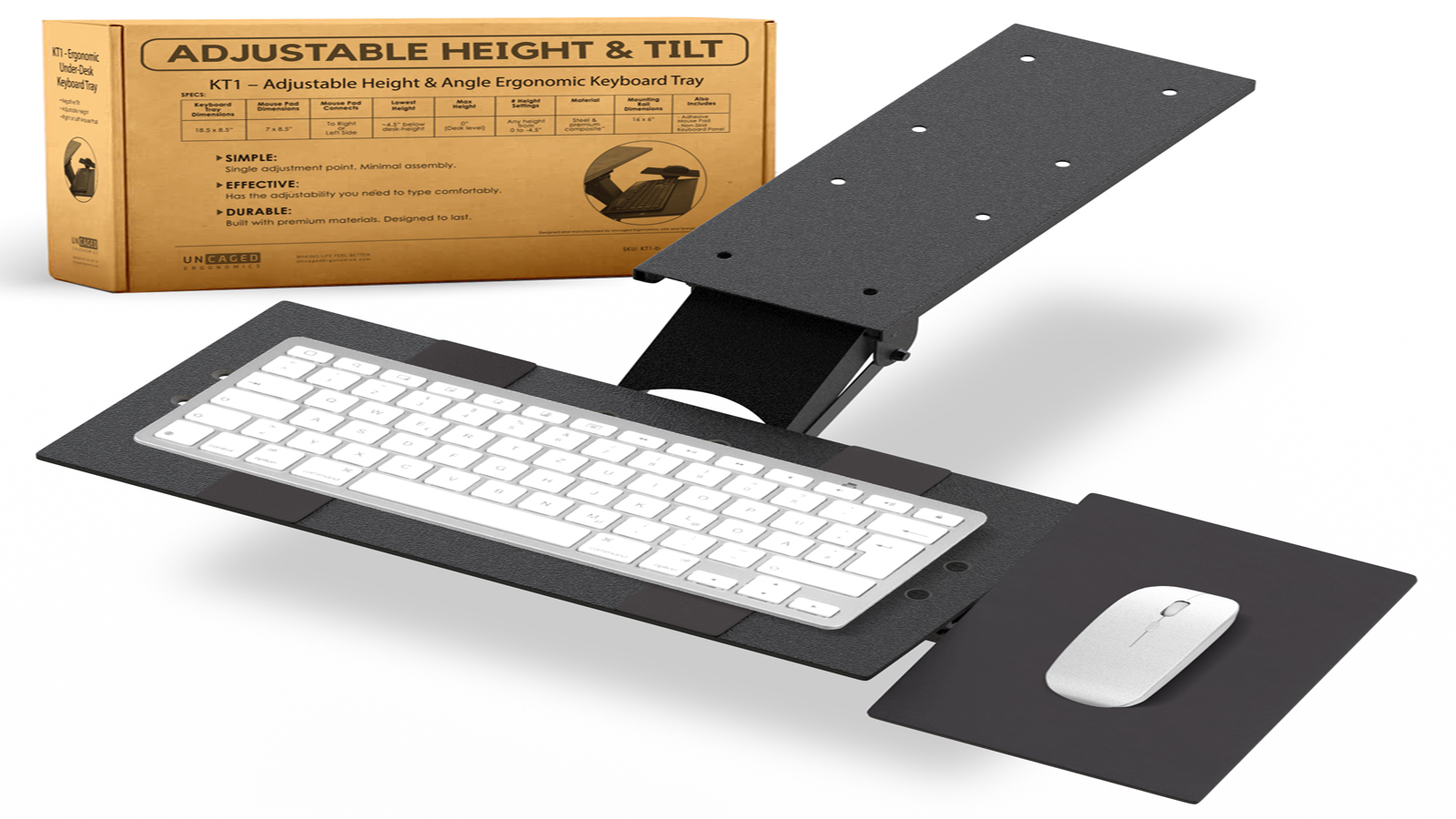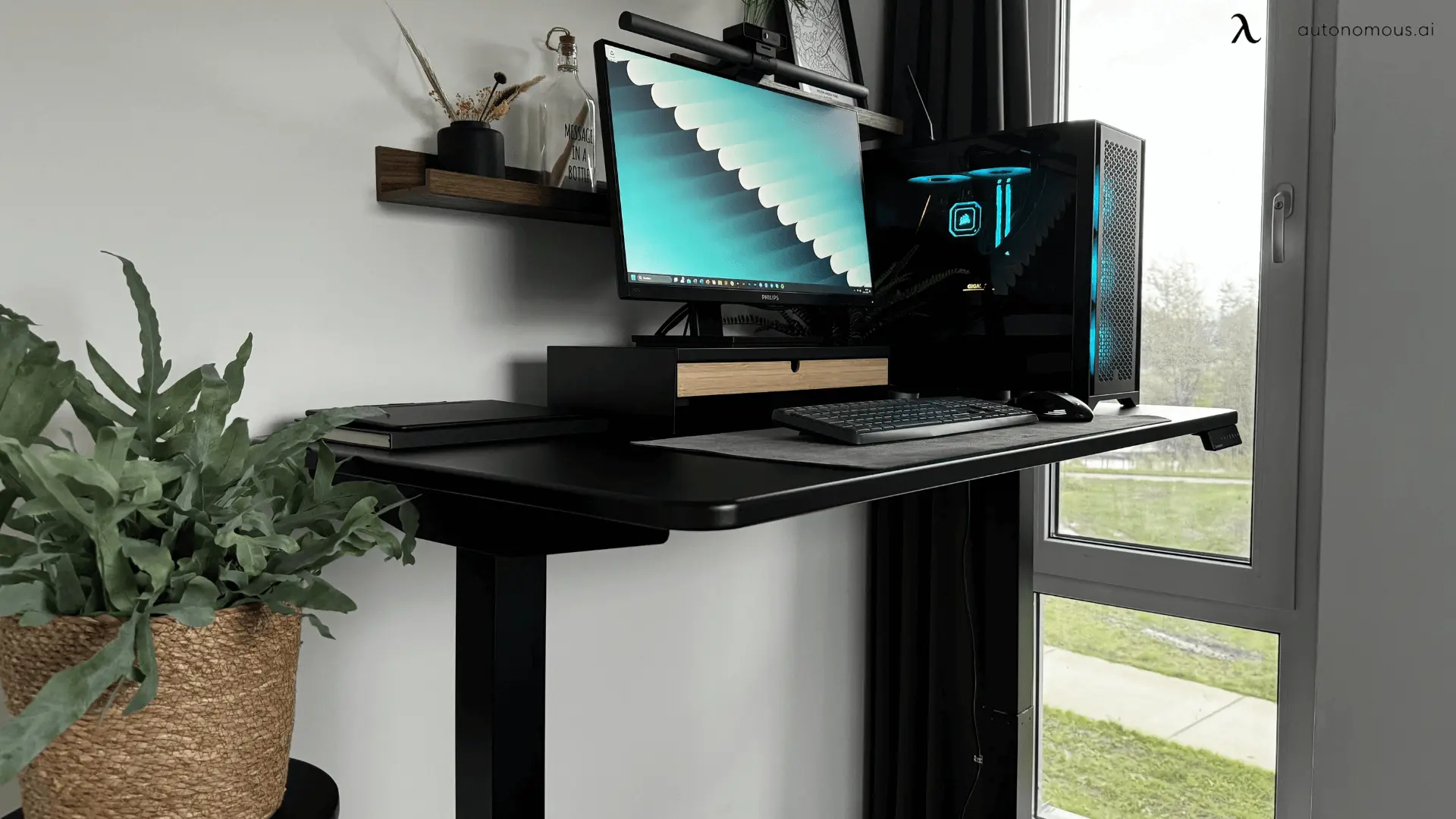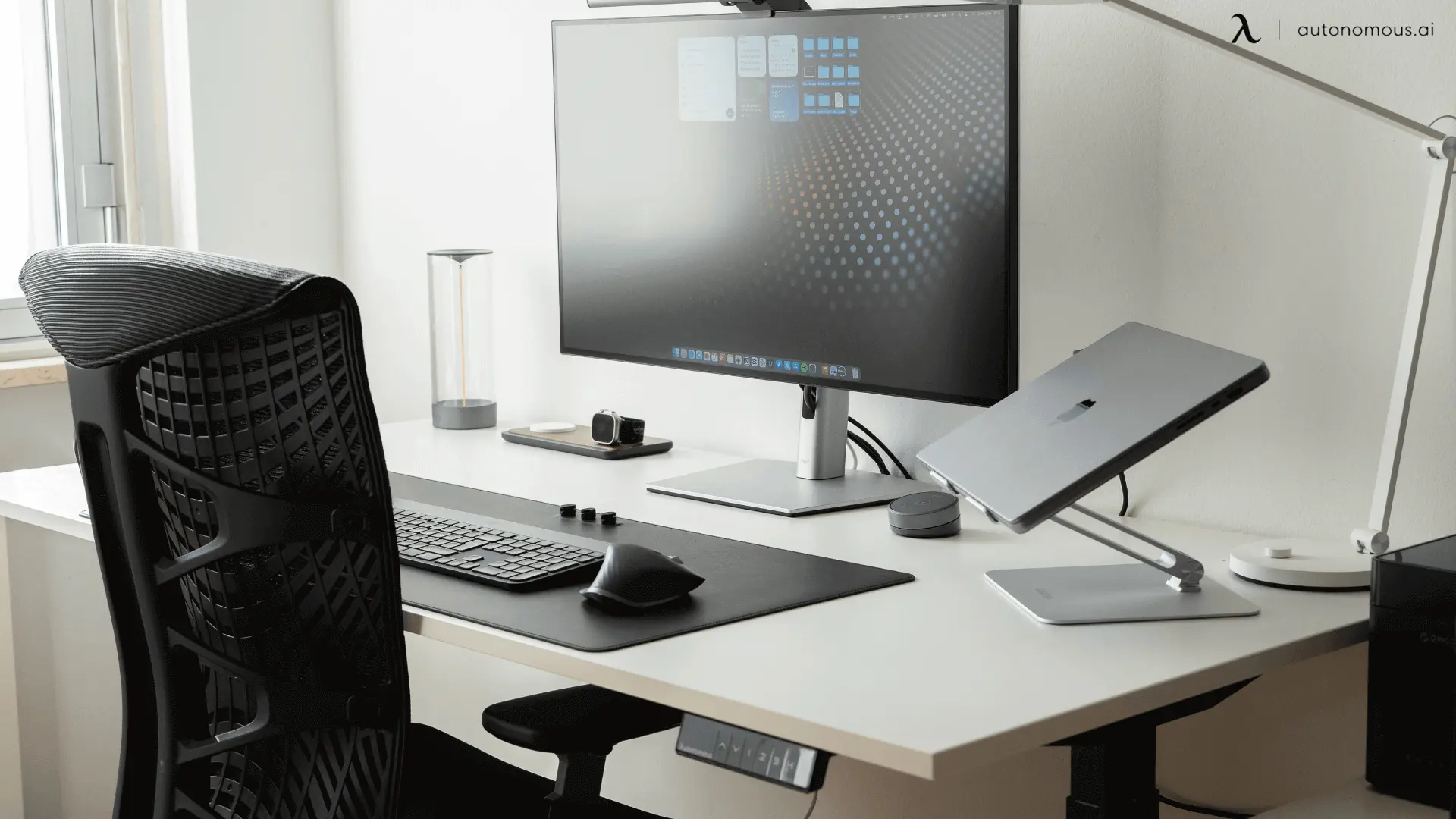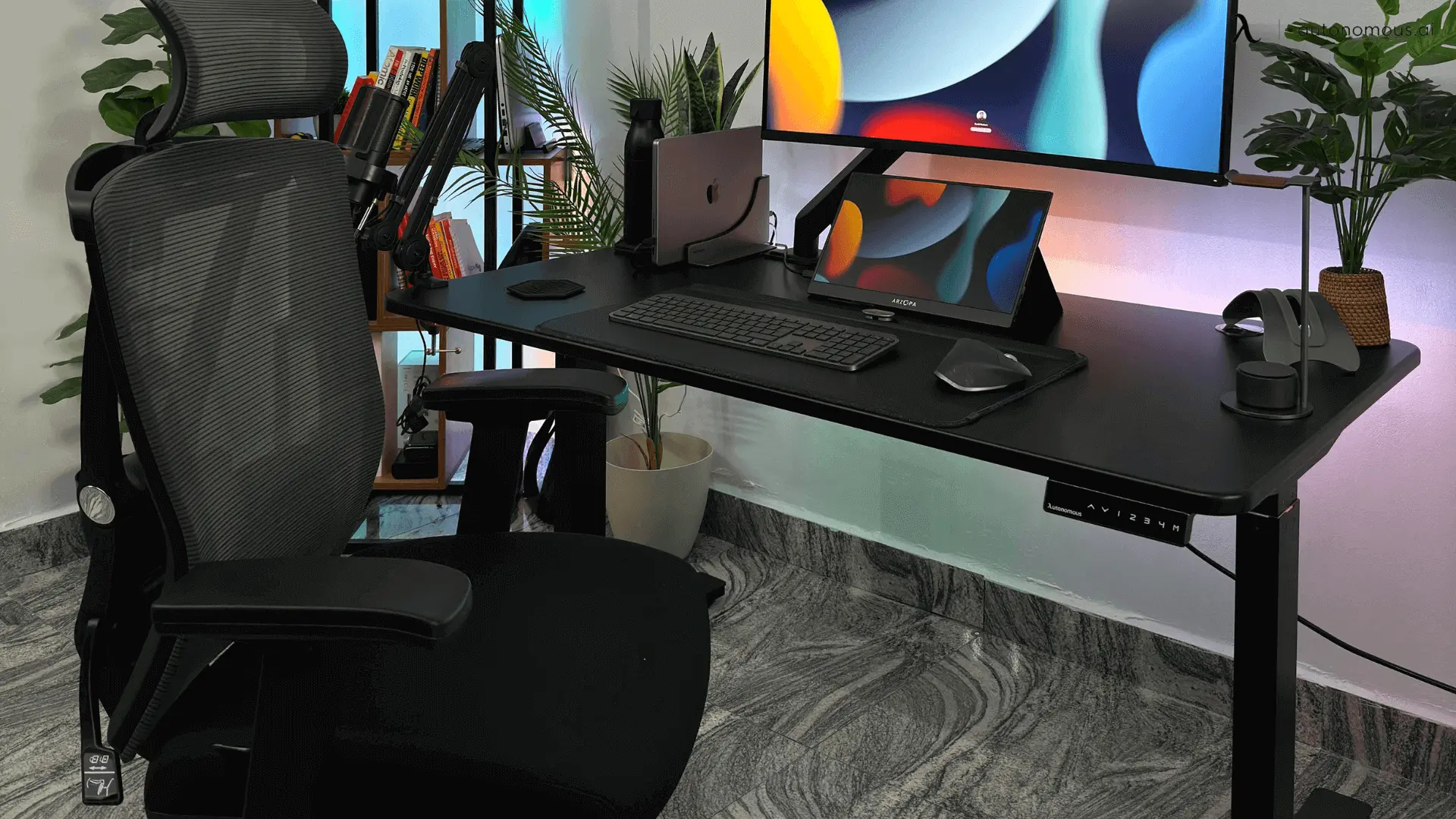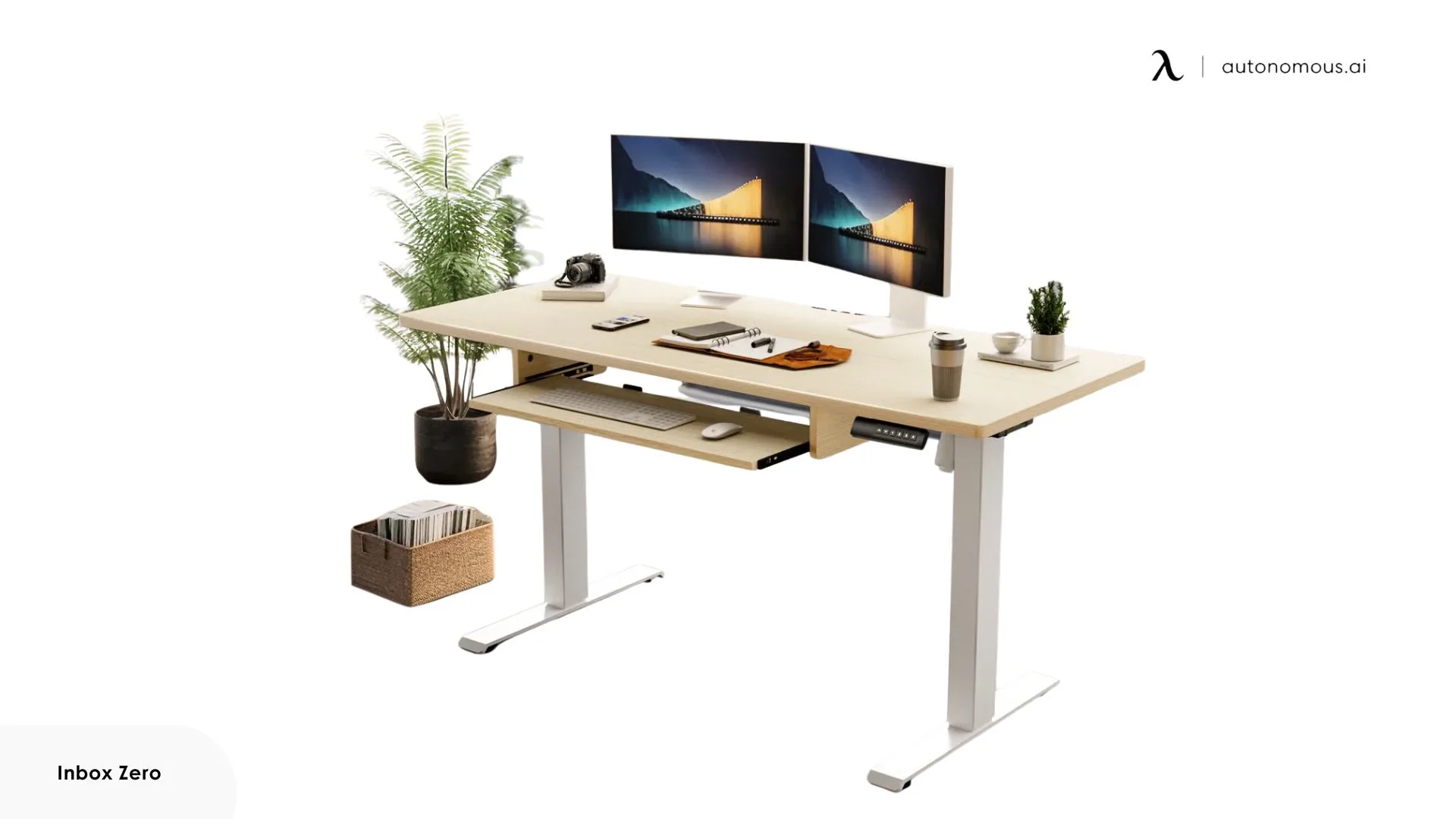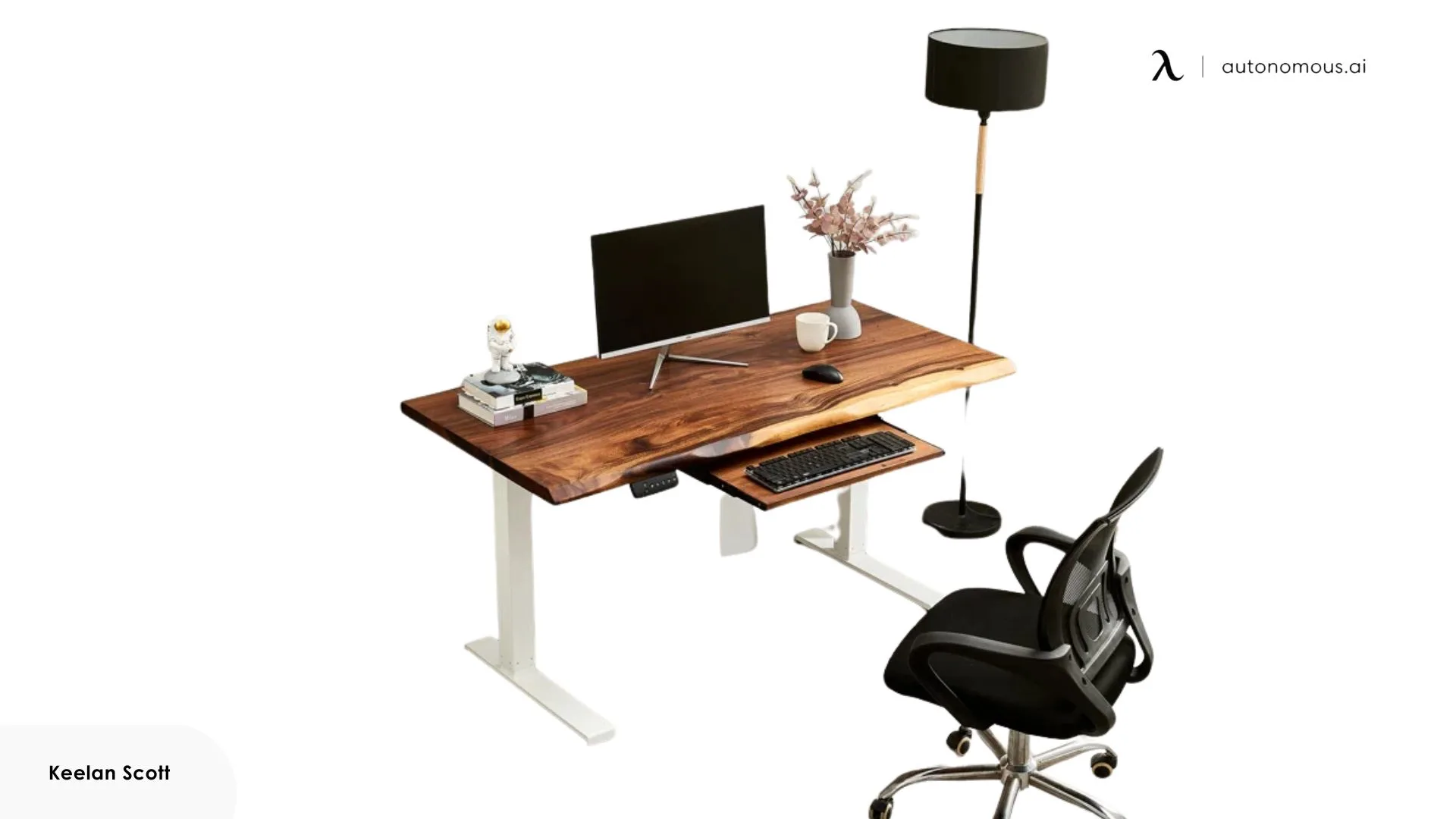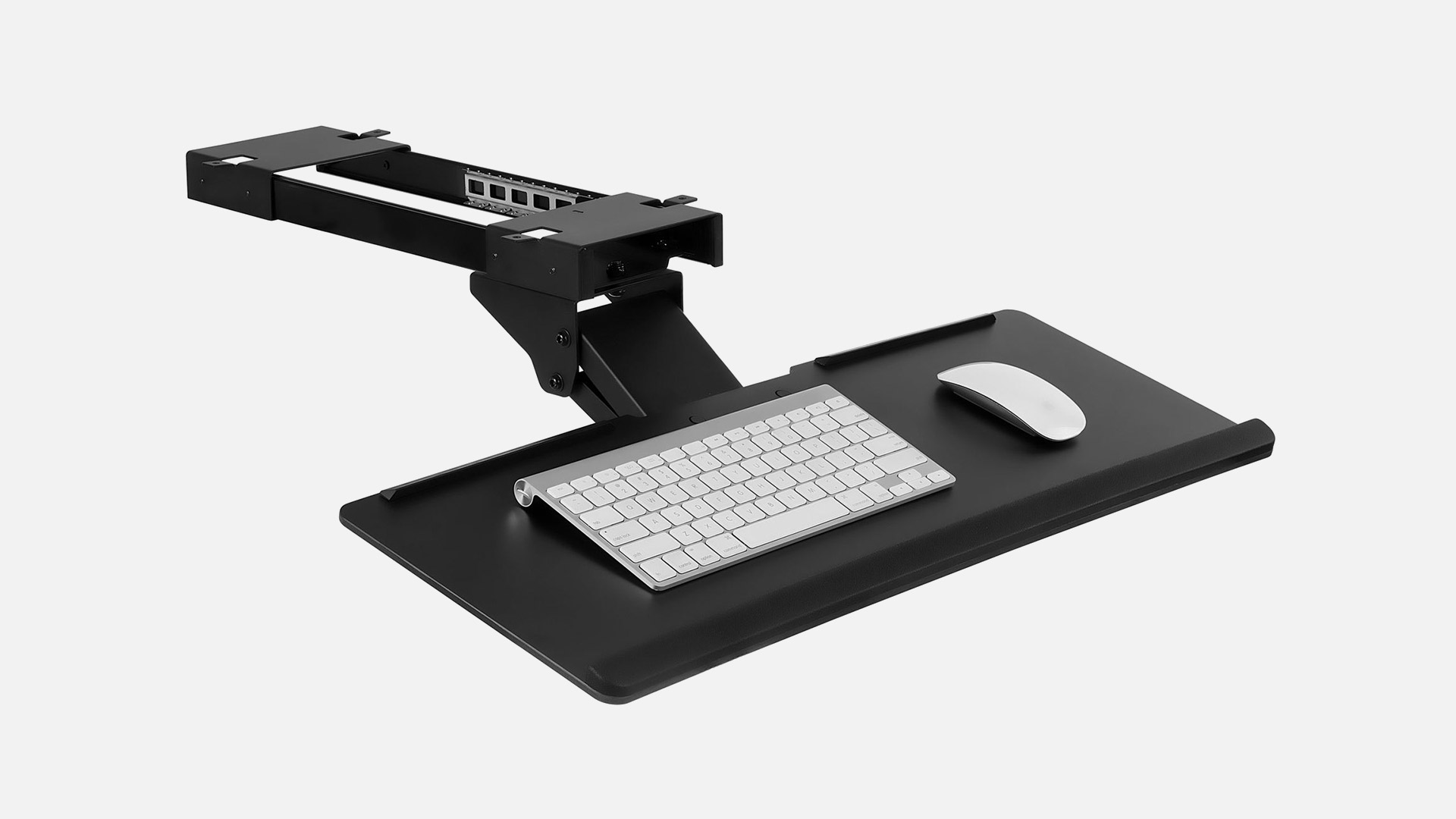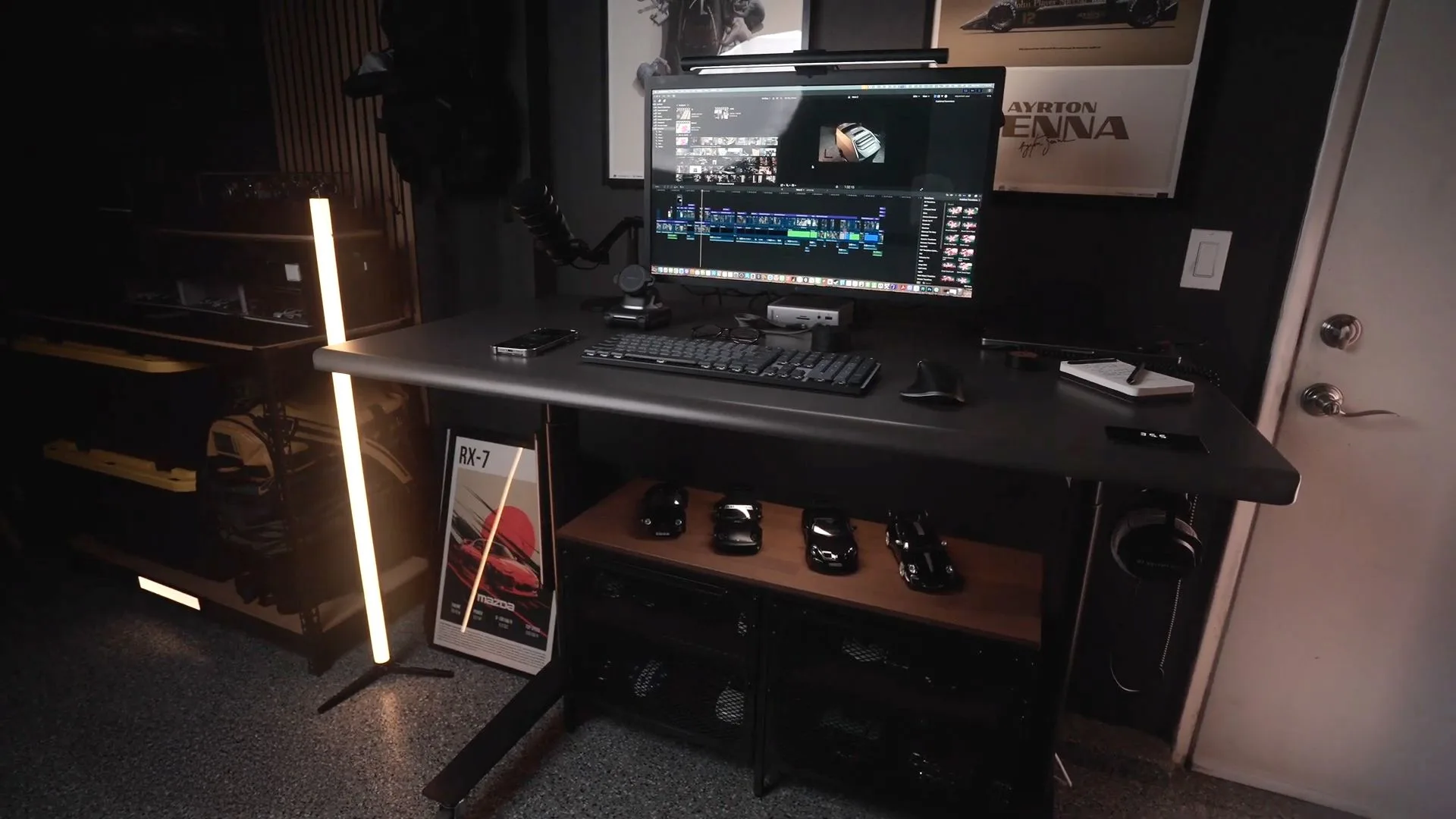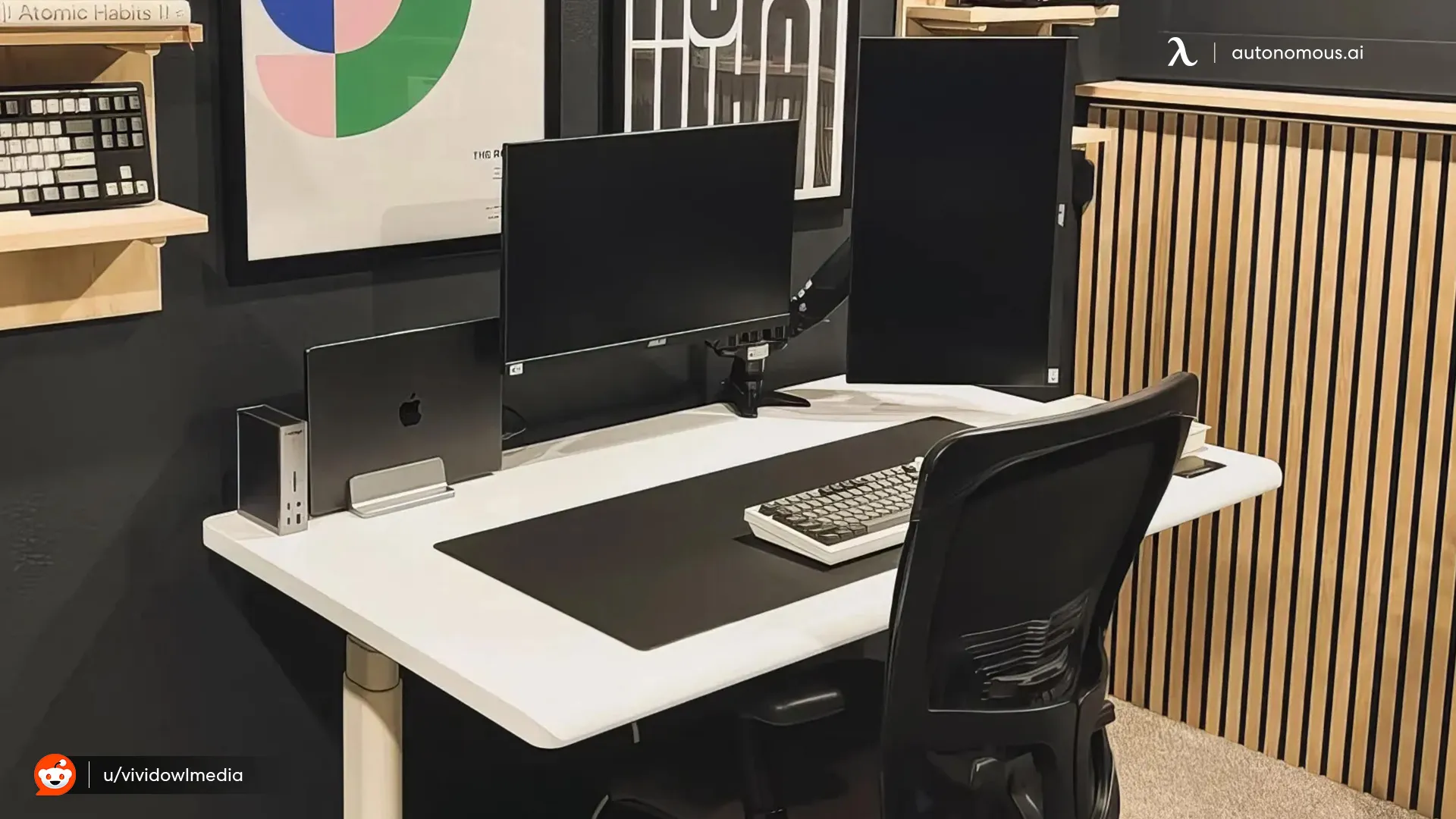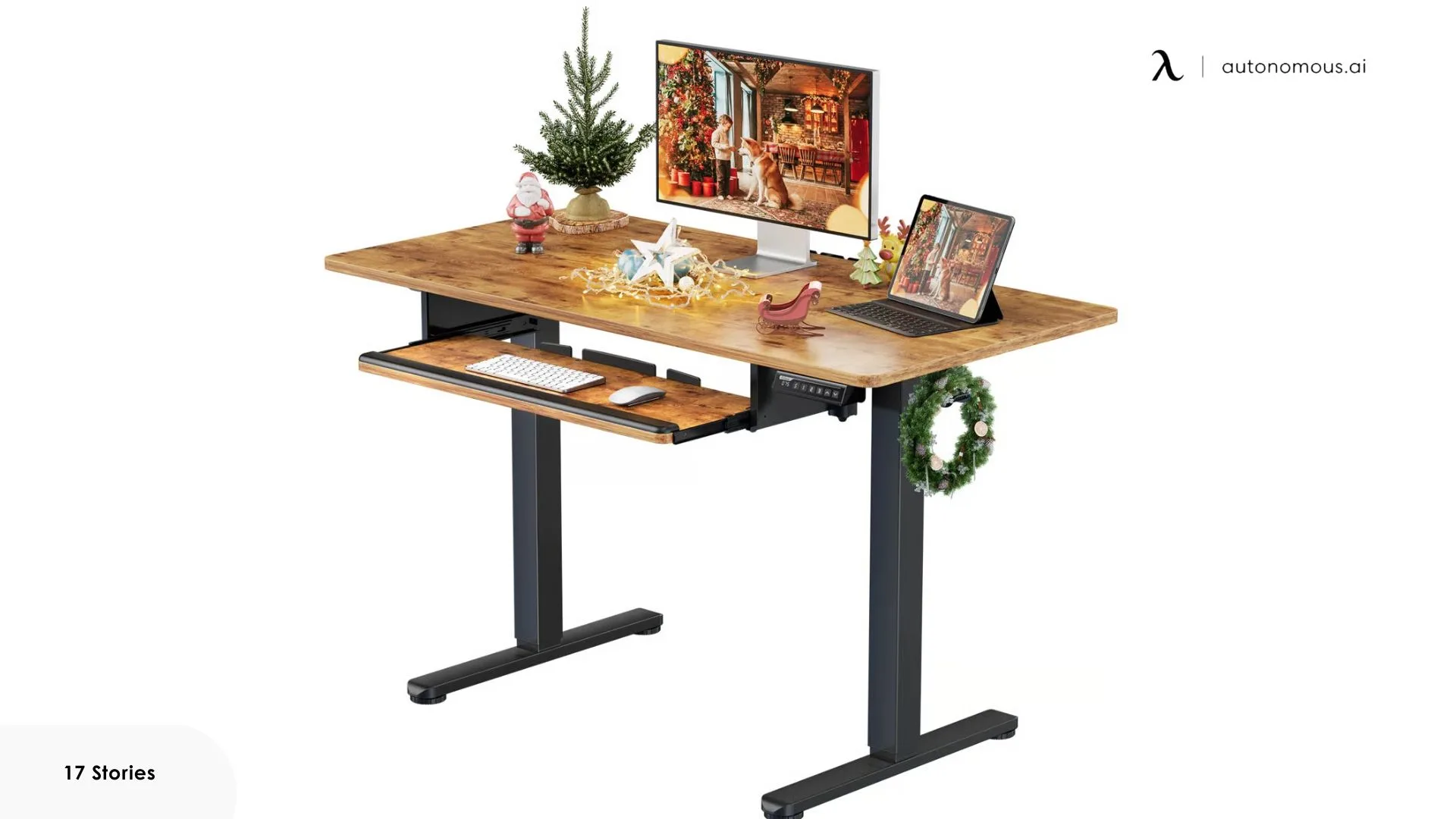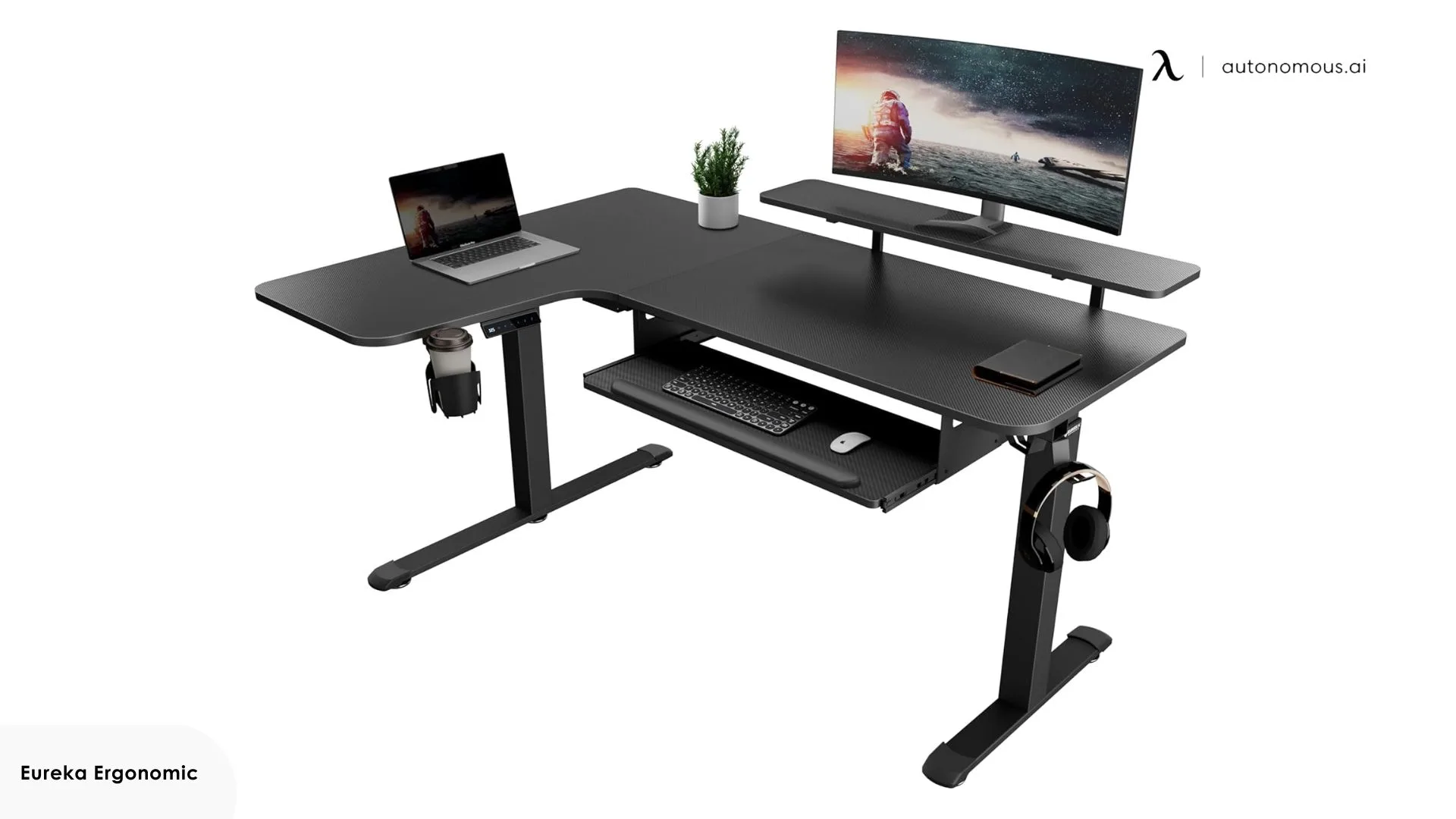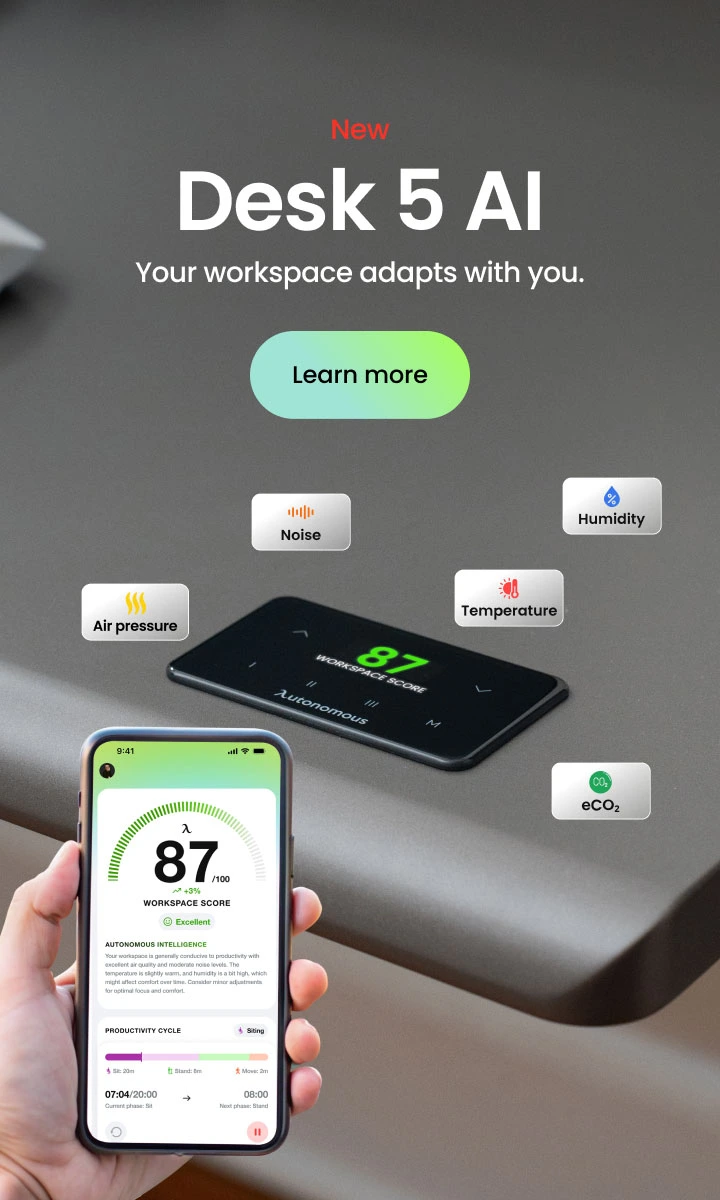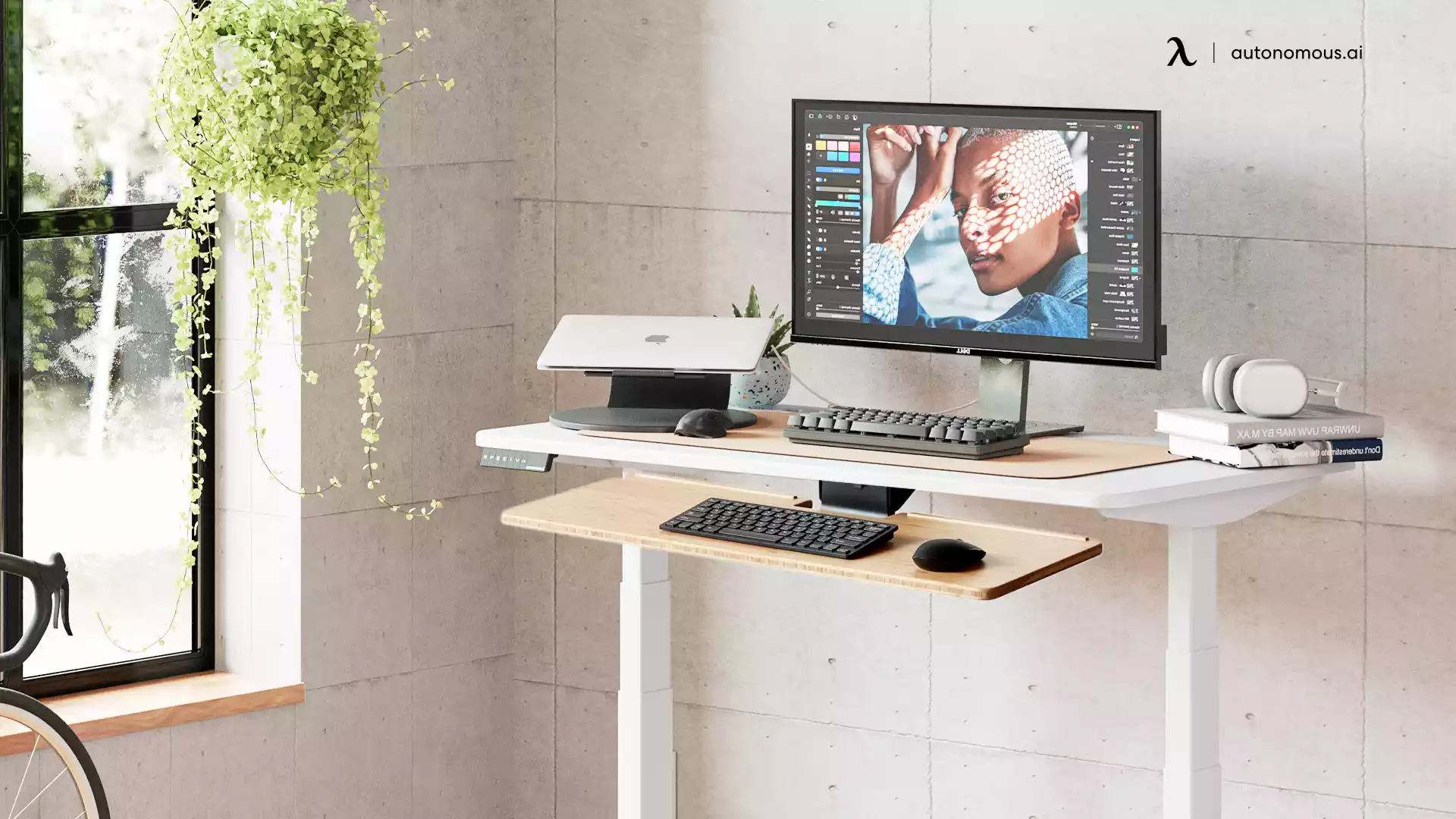
Table of Contents
- Why A Keyboard Tray Matters In A Standing Desk
- Types of Keyboard Trays in Standing Desks
- Best Standing Desks With Keyboard Tray
- 1. Autonomous Desk 2 with Keyboard Tray Attachment
- 2. Inbox Zero Lilja Electric Standing Desk with Keyboard Tray
- 3. Keelan Scott Standing Desk with Keyboard Tray
- 4. Autonomous Desk 5 with Keyboard Tray Attachment
- 5. 17 Stories Wasat Standing Desk with Keyboard Tray
- 6. EUREKA ERGONOMIC Standing Desk with Keyboard Tray
- How To Choose The Best Standing Desk With A Keyboard Tray
- Tips For Getting The Most Out Of A Standing Desk With A Keyboard Tray
- FAQs
- Conclusion
Choosing the best standing desk with a keyboard tray means solving two problems at once: posture and workspace organization. A keyboard tray allows you to type comfortably without raising or lowering your entire desk to awkward heights, while also freeing up prime surface area for the things that matter most.
In 2025, stand-up desks with keyboard trays have become more versatile than ever, with designs that fit compact spaces, gaming setups, or full home offices. Let’s explore why this feature is a must-have for modern work.
Why A Keyboard Tray Matters In A Standing Desk
Most people think about height adjustability when they shop for a standing desk, but the keyboard tray is often overlooked. In reality, it’s one of the features that makes the biggest difference in day-to-day comfort.
A tray allows your keyboard to sit a few inches lower than the main desktop surface, so your monitor can stay at eye level while your arms and wrists rest in a natural position. This prevents the common strain that happens when you’re forced to hunch your shoulders or tilt your wrists upward for hours at a time. Over time, that small adjustment reduces fatigue in the forearms and shoulders and lowers the risk of repetitive strain injuries like carpal tunnel.
There’s also a practical side. By moving the keyboard down, you free up valuable desk space on the main surface. That means more room for a notebook, second monitor, or even just a clean area to think and create. For anyone balancing multiple devices—laptops, tablets, or reference material—a tray can feel like adding square footage to your desk.
In short, a sit-stand desk with a keyboard tray isn’t just an accessory—it’s an ergonomic tool that helps you type with ease, stay aligned with your screen, and keep your workspace organized. It’s a small upgrade that pays off every single workday.
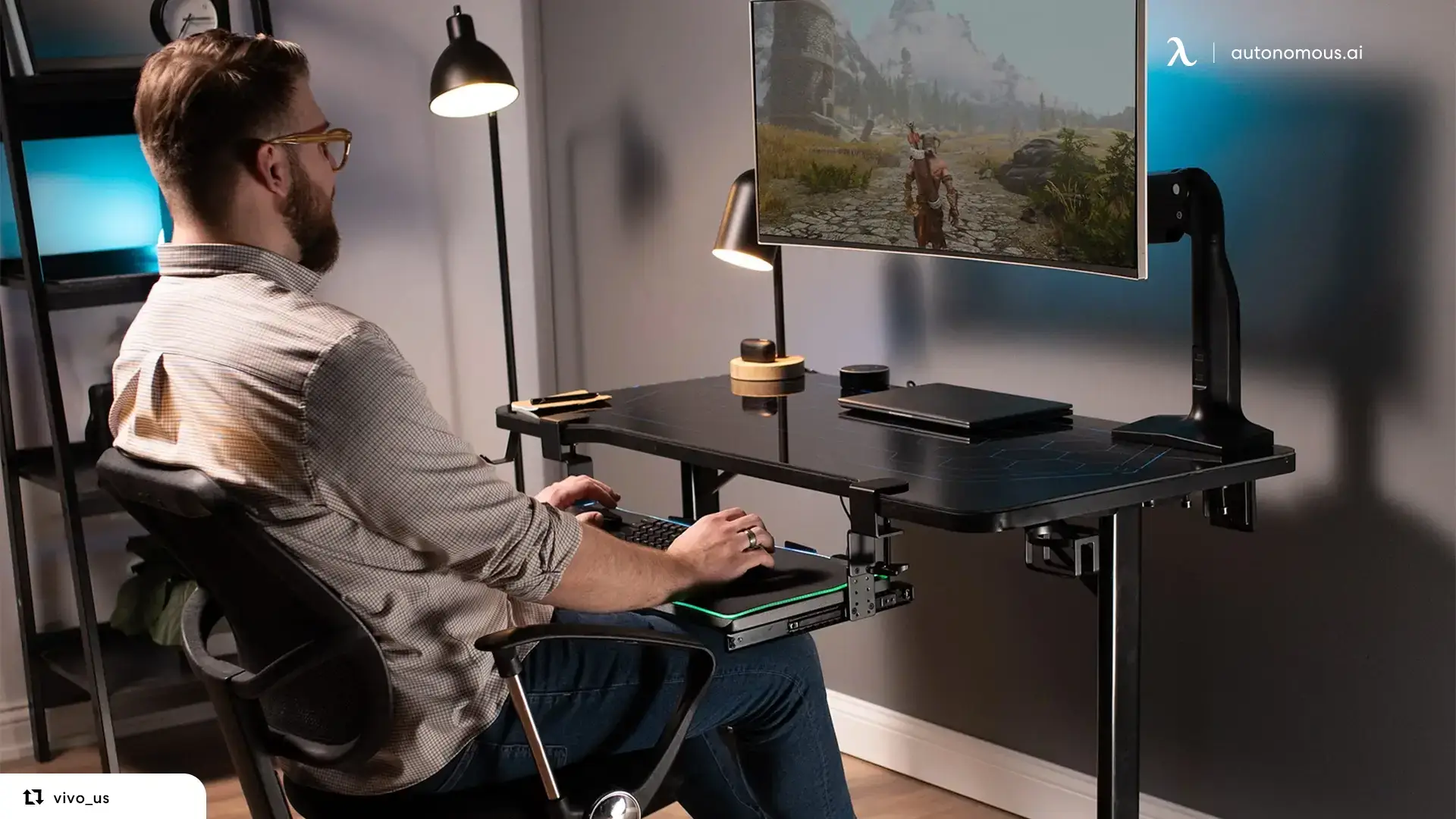
Types of Keyboard Trays in Standing Desks
Not all height-adjustable desks with keyboard trays are created the same, and the right one depends on how you work and the setup you prefer. Here are the most common types you’ll come across when looking at standing desks:
- Stationary trays
These stay fixed in place under the desk surface. They’re simple, sturdy, and usually more affordable, but they don’t offer much flexibility if you like to adjust your typing angle.
- Sliding trays
A popular option for many desks, these trays glide in and out smoothly on rails. You can tuck the keyboard away when you need extra workspace, making it practical for people who like a clean surface.
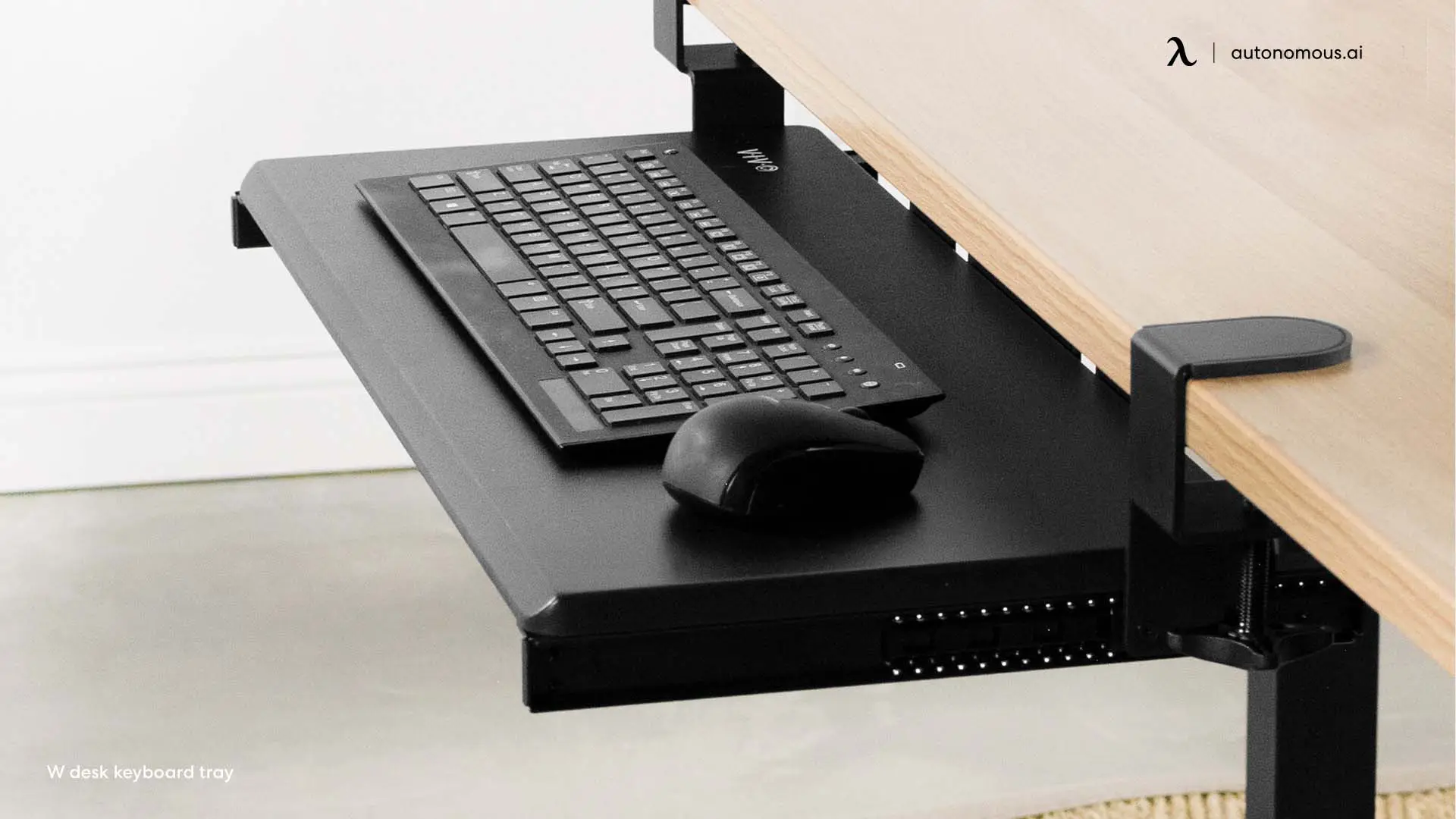
- Ergonomic trays
Designed with adjustability in mind, ergonomic trays can tilt, swivel, or move up and down. They’re the best choice if you want to fine-tune wrist angles and maintain neutral posture throughout long work sessions.
- Keyboard drawers
These combine storage with function, letting you slide out a tray that also holds small items like pens or notepads. They’re less common in modern standing desks, but still useful if you need multitasking storage.
Each style has its place, but what matters most is how well it supports your body’s natural alignment and keeps your workspace functional.
Best Standing Desks With Keyboard Tray
Finding the right adjustable standing desk with a keyboard tray comes down to balancing comfort, function, and style.
Each of the models below brings something unique to the table—whether it’s a sleek electric lift system, corner-friendly design, or smart accessories that keep your setup tidy. Here are the top picks worth considering in 2025.
- Side-by-Side Comparison:
Desk Model | Best For | Tray Type | Adjustment | Standout Feature |
Autonomous Desk 2 + Tray | Remote workers, students | Attachment (sliding) | Electric | Dependable, flexible design |
Inbox Zero Lilja Electric | Home office professionals, writers | Built-in | Dual motor, presets | Sleek, modern look |
Keelan Scott Standing Desk | Designers, developers, creatives | Retractable | Electric/manual mix | Stable, stylish, strong frame |
Autonomous Desk 5 + Tray | Professionals, multitaskers | Attachment (sliding) | Quiet dual motor | Premium design, adaptable setup |
17 Stories Wasat | Freelancers, casual creatives | Retractable | Manual/electric mix | Industrial design, compact footprint |
EUREKA ERGONOMIC | Gamers, coders, intensive users | Spacious w/ wrist rest | Electric | Ergonomic detail + premium features |
1. Autonomous Desk 2 with Keyboard Tray Attachment
The Autonomous Desk 2 is much like that dependable car you’ve relied on for years—it simply gets the job done. When you add the keyboard tray attachment, the whole experience changes: your arms rest lower, typing becomes more comfortable, and your desktop opens up for everything else you need.
Because it’s an attachment, you have the flexibility to choose from various tray styles that suit your working habits. If you decide to switch to a sleeker or more ergonomic design in the future, that’s easy to do, making it feel like a long-term investment. Simple, durable, and adaptable, this stand-up desk with a keyboard tray is a solid choice for daily use.
Best for: Professionals in home offices, writers, and remote teams who want a clean, minimalist desk setup that supports long hours of typing.
.jpg)
Autonomous Desk 2
| Top | Classic Top |
|---|---|
| Dimensions | 53"L x 29"W x 1"H |
| Shipping dimensions | 56"L x 33"W x 3"H x 47 lbs |
| Colors | White, Black, Walnut, White Oak, Bamboo |
| Material | Warp-proof MDF wood Natural Bamboo |
| Model | 2-Stage | 3-Stage |
|---|---|---|
| Motor type | Dual | Dual |
| Lifting speed | 1.1”/sec | 2.3”/sec |
| Lifting capacity | 250 lbs | 310 lbs |
| Noise level | 45 dB | 40 dB |
| Height range (without top) | 27.2" - 46.5" | 25.2" - 51" |
| Height range (with top) | 28.3" - 47.5" | 26.2" - 52" |
| Length range | 39.8'' - 59'' | 40" - 73" |
| Frame foot width | 23.6'' | 27.5" |
| Material | SPCC steel | SPCC steel |
| Colors | White, Black | White, Black, Grey |
| Outlet voltage | 110-240V | 110-240V |
| Anti - collision | Yes | Yes |
| Shipping dimensions | 39"L x 11"W x 9"H x 51 lbs | 43"L x 13"W x 10"H x 70 lbs |
2. Inbox Zero Lilja Electric Standing Desk with Keyboard Tray
The Lilja feels smooth and seamless from the start. The tray isn’t an afterthought—it’s built in, flush with the design, and large enough to fit both a keyboard and mouse comfortably.
Its dual motors are impressively quiet, and the memory presets are a real time-saver if you change positions often. What you don’t get here is deep ergonomic customization; the tray doesn’t tilt or angle, but if your priority is a clean, integrated setup that just works, this one nails it.
Best for: Remote workers, students, and anyone wanting a budget-friendly ergonomic height-adjustable desk with a keyboard tray that can adapt over time.
3. Keelan Scott Standing Desk with Keyboard Tray
What I noticed first with this electric standing desk with a keyboard tray was the stability. The tray feels solid even when typing fast, and the frame doesn’t wobble under the weight of a full setup.
It has that balance of style and sturdiness that makes you want actually to sit down and work at it. No gimmicks, just smooth adjustability and a tray that feels like it belongs. It’s the kind of desk you don’t have to think about—it quietly does its job well.
On the flip side, it doesn’t come with many extras—no USB ports, no built-in cable channels—so it’s really about stability over features. If you want a standing desk with an adjustable keyboard tray that doesn’t get in your way and just feels solid, this is it.
Best for: Users who want dependable strength wrapped in a clean design for their home office setup.
4. Autonomous Desk 5 with Keyboard Tray Attachment
The Autonomous Desk 5 raises the bar with quieter motors, stronger frame stability, and a sleek finish. Adding the new keyboard tray attachment transforms it into a workstation built for long, comfortable hours.
I especially liked how much space the tray frees on the desktop for dual monitor setups or creative gear. Because the tray is an attachment, it stays flexible—compatible with different designs if you ever want to swap or upgrade.
For anyone seeking a future-ready electric standing desk with a keyboard tray, this setup delivers.
Best for: Creatives and multitaskers who want a premium, future-ready workstation that adapts as their workflow evolves.
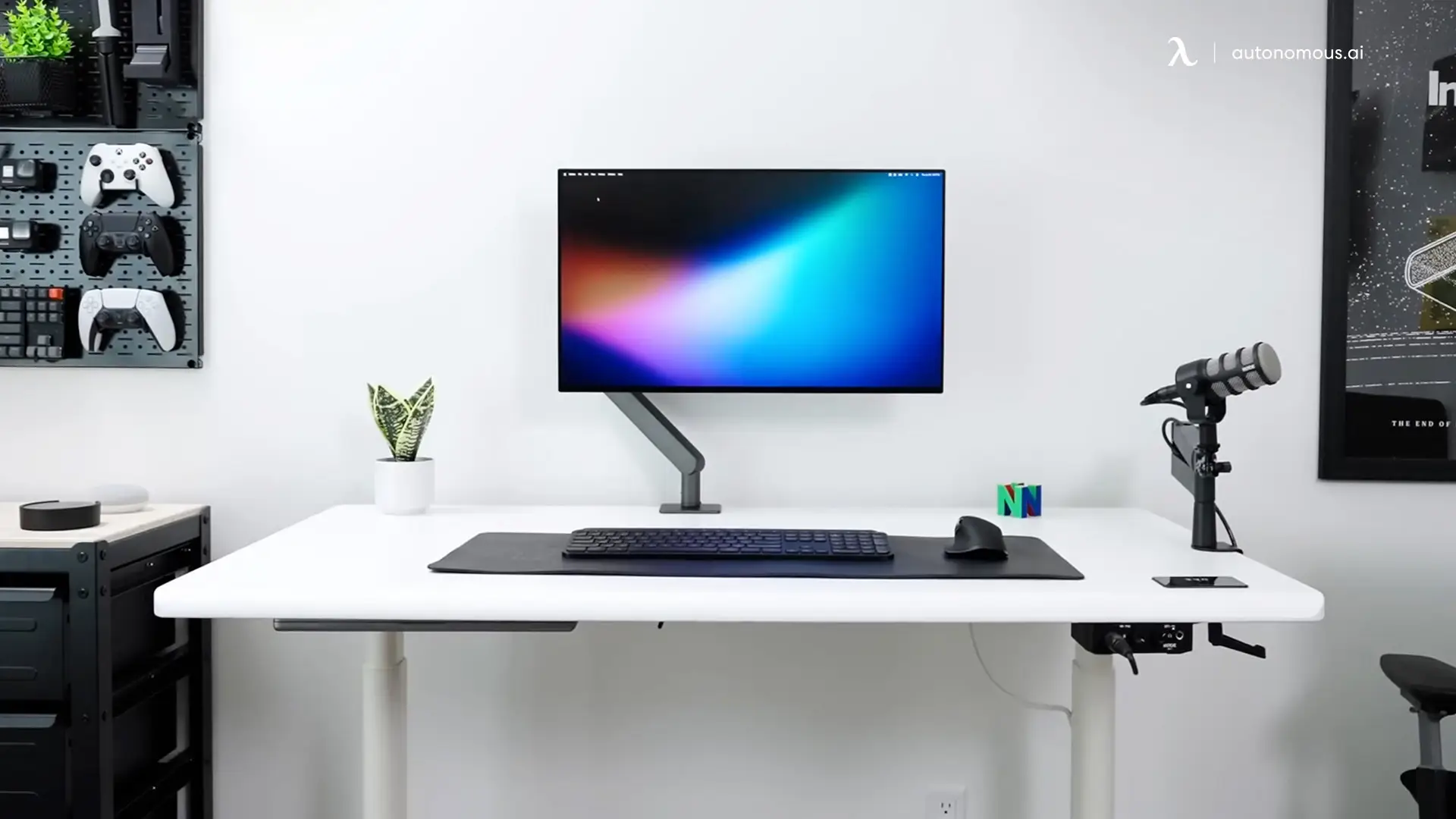
Autonomous Desk 5
| Dimensions | 53"L x 29"W x 1.2"H |
|---|---|
| Colors | Stone Desert, Titanium White, Meteor Grey |
| Coating | Special customize sealing paint based on Green Standard |
| Material | HDF wood |
| Motor type | Dual |
|---|---|
| Lifting speed | 1.2”/sec |
| Lifting capacity | 330 lbs |
| Noise level | 40 dB |
| Height range (without top) | 29.5" - 48.5" |
| Height range (with top) | 30.7" - 49.7" |
| Length range | 40.4" - 70.9" |
| Frame foot width | 26.4" |
| Material | SPCC steel |
| Colors | Stone Desert, Titanium White, Meteor Grey |
| Outlet voltage | 110-240V |
| Anti - collision | Yes |
| Motor type | Dual |
|---|---|
| Lifting speed | 1.6”/sec |
| Lifting capacity | 330 lbs |
| Noise level | 40 dB |
| Height range (without top) | 26" - 51.5" |
| Height range (with top) | 27.2" - 52.7" |
| Length range | 40.4" - 70.9" |
| Frame foot width | 26.4" |
| Material | SPCC steel |
| Colors | Stone Desert, Titanium White, Meteor Grey |
| Outlet voltage | 110-240V |
| Anti - collision | Yes |
5. 17 Stories Wasat Standing Desk with Keyboard Tray
If you like your workspace to have personality, the Wasat stands out. The industrial wood-and-steel design gives it character, and the tray is functional enough to make typing comfortable without feeling like it’s just there for show.
It’s not the biggest or most feature-heavy desk, but it hits a sweet spot for people who want something compact and practical that still looks different from the standard office fare.
Best for: Home office users, freelancers, and casual creatives who want a sit-stand desk with a keyboard tray that looks unique without giving up ergonomic basics.
6. EUREKA ERGONOMIC Standing Desk with Keyboard Tray
This is the best standing desk with a keyboard tray for people who obsess over details. The tray is one of the best I’ve tested—wide, supportive, with a wrist rest that makes long typing sessions easier.
Add extras like USB ports, cable management, and a smooth electric lift, and you get the sense that the whole design was built with the user in mind. The trade-off here is assembly: it takes more effort to set up, and the price tag is higher than most
Best for: Gamers, coders, and professionals who prioritize comfort during long sessions and appreciate extra features that streamline their setup.
How To Choose The Best Standing Desk With A Keyboard Tray
With so many options on the market, finding the right adjustable standing desk with a keyboard tray comes down to matching it to the way you work. Here are the key factors to keep in mind before investing:
- Space and Layout
Do you have room for a full-sized L-shaped desk, or does your desk setup need a compact and portable standing desk? Creatives and multitaskers often benefit from larger surfaces, while freelancers or students may prefer smaller, space-saving designs.
- Tray Design and Adjustability
Some trays are fixed in place, while others slide, tilt, or swivel. If you type for hours, a tray with wrist support or tilt adjustment is worth it. If you only use a keyboard part of the time, a simple retractable tray may be enough.
- Type of Desk Adjustment
Manual standing desks are budget-friendly but require more effort to switch positions. Electric desks, especially those with dual motors, make adjustments smoother and are better suited for shared or high-use ergonomic workstations.
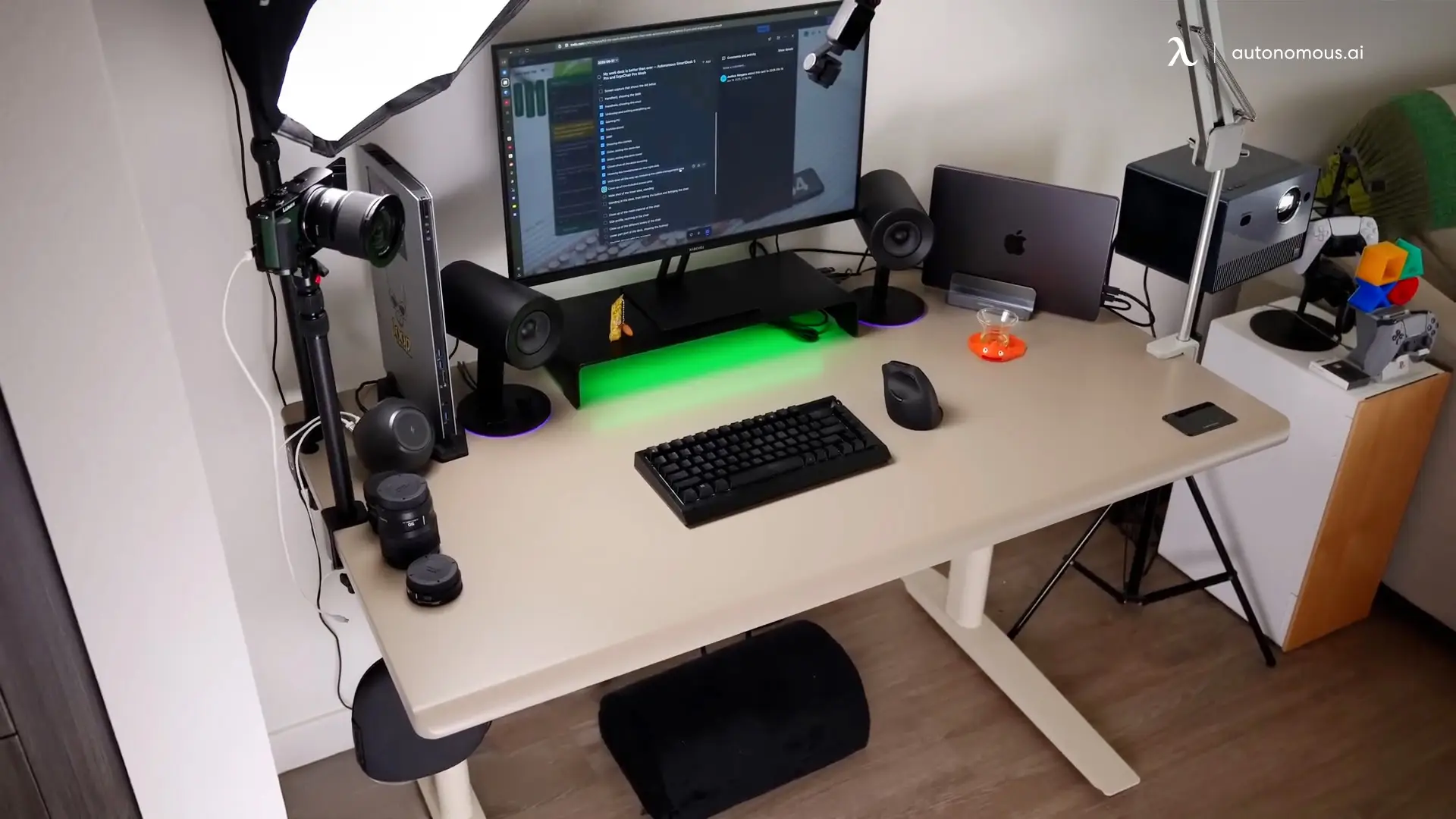
- Ergonomic Priorities
Think about where you feel strain now. If it’s your wrists, a supportive tray is key. If it’s your shoulders or neck, make sure the ideal standing desk height range works for your body size and monitor setup.
- Extra Features
Cable management, USB ports, and hooks for accessories may not be essential, but they can make a difference in how streamlined your workspace feels. If you’re a gamer or someone with lots of devices, these details matter more.
- Budget vs. Longevity
Entry-level desks get you started, but premium models often justify their price with smoother lifts, better stability, and trays built for all-day use. Consider whether you want something temporary or a stand-up desk with a keyboard tray that will carry you through years of work.
Tips For Getting The Most Out Of A Standing Desk With A Keyboard Tray
A standing desk with an adjustable keyboard tray is a strong start, but how you set it up makes the real difference. Here are a few expert tips to help you work more comfortably and protect your long-term health:
- Keep your wrists neutral
When typing, your wrists should stay straight—not bent up or down. The keyboard tray should position your arms so your elbows rest close to a 90-degree angle, with your forearms parallel to the floor. A wrist rest can also reduce strain during longer typing sessions, and following the proper mouse and keyboard position helps keep everything aligned.
- Adjust your monitor height
Your eyes should naturally fall about two to three inches below the top of the screen. If your monitor sits too low, you’ll slouch; too high, and you’ll tilt your head back. Consider a monitor arm or riser if your desk surface doesn’t line up correctly.

- Mind the distance
Keep your monitor about an arm’s length away. This helps you avoid leaning forward and keeps your neck in a relaxed, upright position. If you use dual monitors, angle them slightly inward so you don’t have to twist your neck constantly.
- Pair with an ergonomic chair
A good office chair complements your standing desk by supporting your spine and encouraging better posture when you sit. Look for adjustable lumbar support, a seat cushion that doesn’t cut into your thighs, and armrests that line up with your keyboard tray height.
- Don’t stay frozen in one position
The biggest ergonomic win is movement. Switch between sitting and standing throughout the day, and take short breaks to stretch your shoulders, hips, and wrists. The desk and tray give you flexibility—use them.
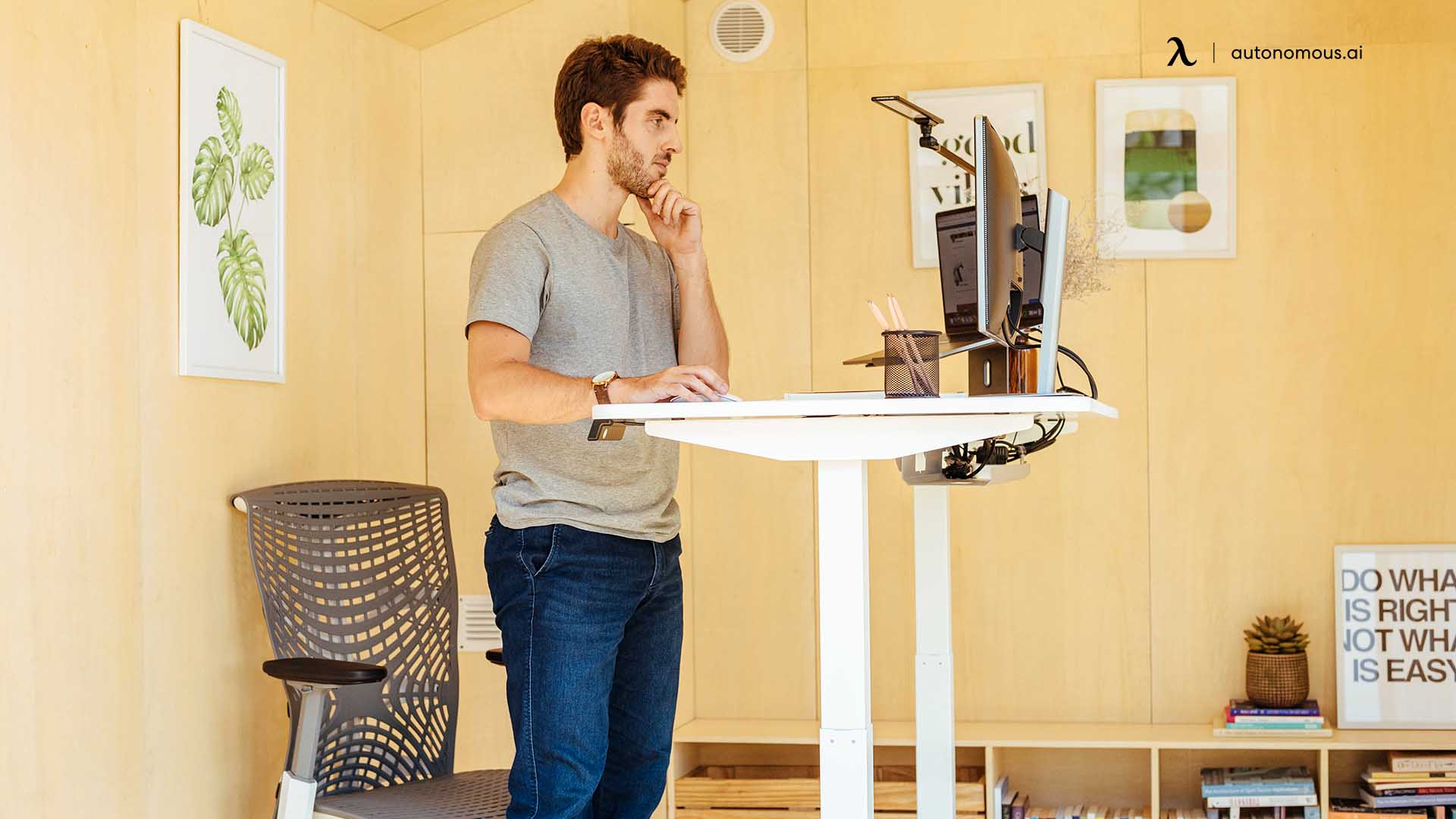
FAQs
1. What is the best standing desk with a keyboard tray?
The best standing desk with a keyboard tray is one that balances ergonomics, stability, and available space. Look for options with smooth height adjustment, a sturdy frame, and a tray wide enough for both keyboard and mouse.
2. Is a standing desk with a keyboard tray more ergonomic?
Yes. A desk with a tray allows your keyboard to sit lower than the main surface, keeping wrists straight and elbows at a natural angle while your monitor stays at eye level.
3. Can I add a keyboard tray to a standing desk?
Many standing desks allow add-on trays that slide underneath the desktop. This gives flexibility if your desk didn’t include a built-in tray, letting you choose the design that suits your typing style.
4. Are built-in keyboard trays better than attachments?
Built-in trays usually look more seamless and sturdy, while attachments offer flexibility to swap or upgrade later. The right choice depends on whether you value aesthetics or adaptability more.
5. What’s the ideal height for a standing desk with a keyboard tray?
The tray should allow your elbows to bend close to 90 degrees with wrists straight. Your monitor should then be positioned so your eyes land just below the top of the screen.
6. Do keyboard trays on standing desks help productivity?
Yes. A tray frees up desk surface space and creates a more comfortable typing position. This reduces fatigue and distraction, helping you stay focused during long work sessions.
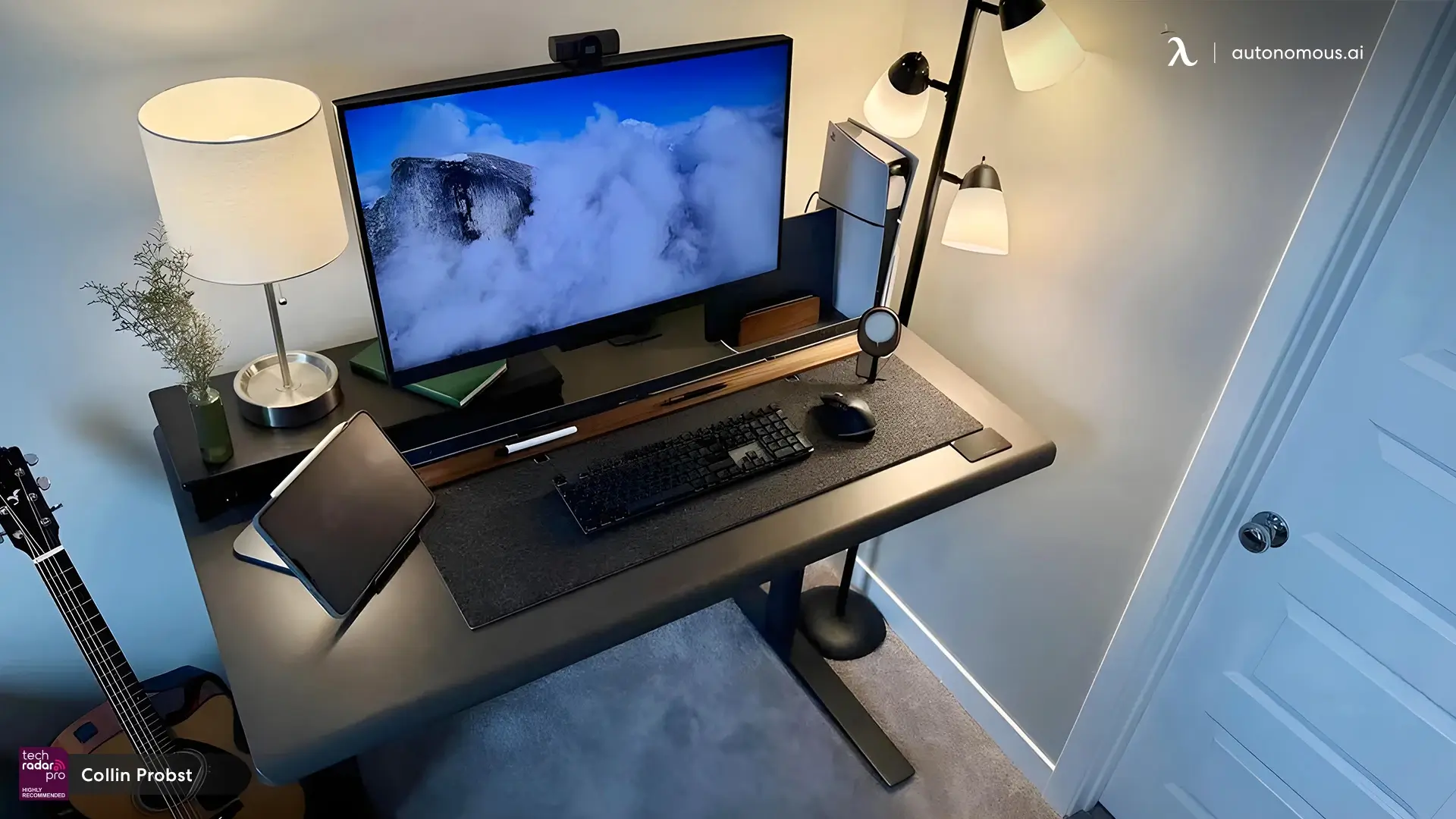
7. Are standing desks with keyboard trays good for gaming?
They can be. A tray keeps your controls at a natural height while leaving the main surface free for multiple monitors, headsets, and other accessories common in gaming setups.
8. What is the difference between a sit-stand desk with a keyboard tray and a regular standing desk?
A sit-stand desk with a tray separates typing height from monitor height, creating better alignment. Regular desks without trays often force compromises between wrist comfort and screen position.
9. Do I really need a keyboard tray on a height-adjustable desk?
If you type for long hours, a tray helps by reducing strain on wrists and shoulders. For light or occasional use, you may be comfortable keeping the keyboard on the main surface.
10. How wide should a standing desk with an adjustable keyboard tray be?
Most trays are around 25–30 inches wide, enough for a keyboard and mouse. If you use larger peripherals, look for wider trays or ones with integrated wrist rests.
11. Can a keyboard tray fit on an L-shaped standing desk?
Yes. Many L-shaped desks support trays that slide under the longer section, giving ergonomic typing space without interfering with the corner layout.
12. Which standing desk with a keyboard tray works best for small spaces?
Compact desks with slim, retractable trays are ideal for smaller rooms. They provide ergonomic support while minimizing the footprint of the setup.
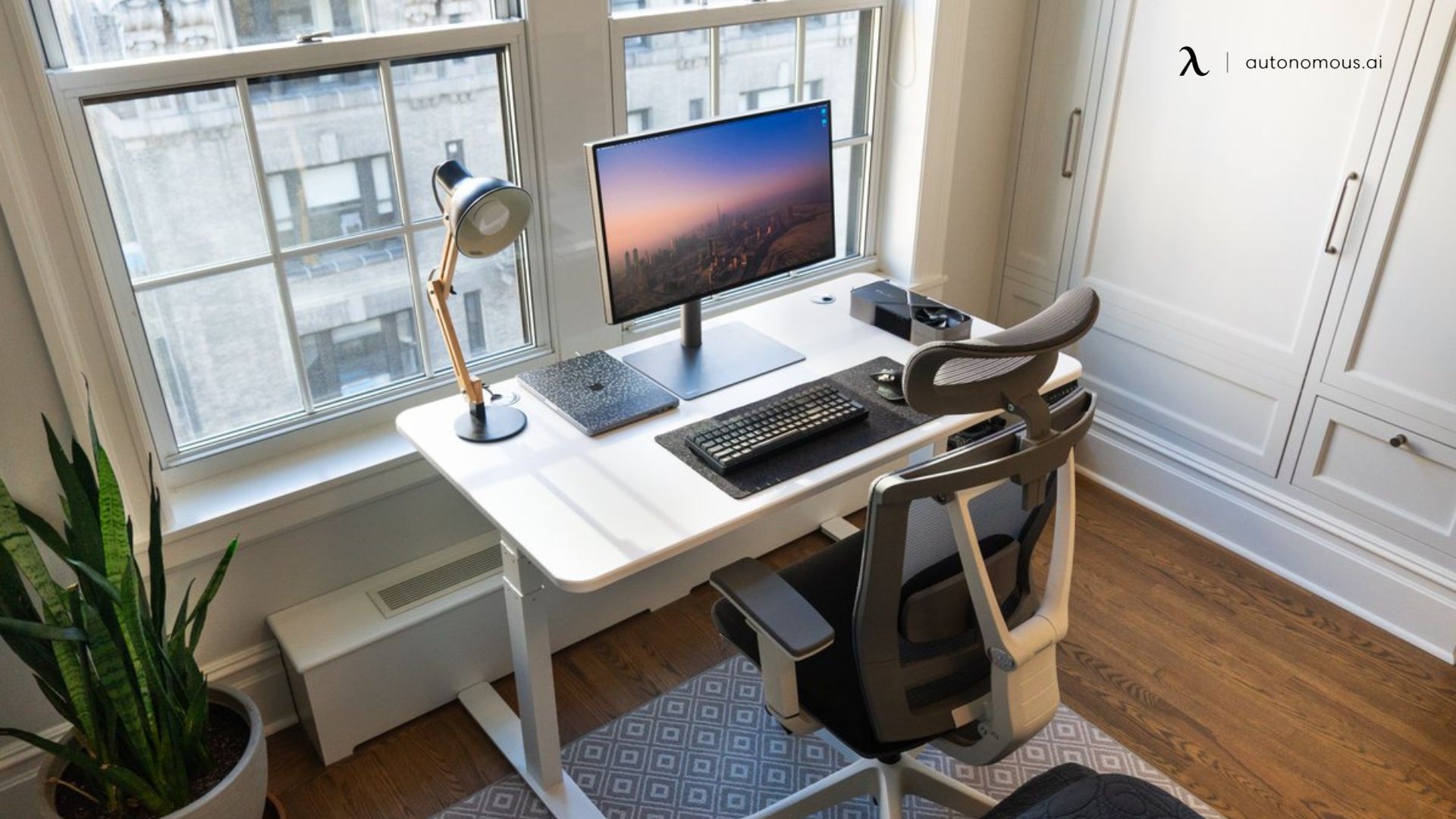
Conclusion
A standing desk with a keyboard tray isn’t just a small upgrade—it can reshape the way you work every day. By separating typing height from monitor height, you reduce strain, gain more usable desktop space, and create a setup that feels natural whether you’re working, gaming, or creating.
The right choice depends on your priorities: some desks stand out for stability, others for design, and some for extra features that streamline your workflow. Whether you prefer a simple, adaptable attachment or a fully integrated tray, the key is choosing a setup that supports both your body and your routine.
Investing in ergonomics now means less fatigue, fewer distractions, and a workspace that helps you focus on what matters most.
Spread the word
.svg)

